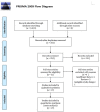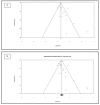Obesity and Mortality Among Patients Diagnosed With COVID-19: A Systematic Review and Meta-Analysis
- PMID: 33634150
- PMCID: PMC7901910
- DOI: 10.3389/fmed.2021.620044
Obesity and Mortality Among Patients Diagnosed With COVID-19: A Systematic Review and Meta-Analysis
Abstract
Coronavirus disease 2019 (COVID-19) has already raised serious concern globally as the number of confirmed or suspected cases have increased rapidly. Epidemiological studies reported that obesity is associated with a higher rate of mortality in patients with COVID-19. Yet, to our knowledge, there is no comprehensive systematic review and meta-analysis to assess the effects of obesity and mortality among patients with COVID-19. We, therefore, aimed to evaluate the effect of obesity, associated comorbidities, and other factors on the risk of death due to COVID-19. We did a systematic search on PubMed, EMBASE, Google Scholar, Web of Science, and Scopus between January 1, 2020, and August 30, 2020. We followed Cochrane Guidelines to find relevant articles, and two reviewers extracted data from retrieved articles. Disagreement during those stages was resolved by discussion with the main investigator. The random-effects model was used to calculate effect sizes. We included 17 articles with a total of 543,399 patients. Obesity was significantly associated with an increased risk of mortality among patients with COVID-19 (RRadjust: 1.42 (95%CI: 1.24-1.63, p < 0.001). The pooled risk ratio for class I, class II, and class III obesity were 1.27 (95%CI: 1.05-1.54, p = 0.01), 1.56 (95%CI: 1.11-2.19, p < 0.01), and 1.92 (95%CI: 1.50-2.47, p < 0.001), respectively). In subgroup analysis, the pooled risk ratio for the patients with stroke, CPOD, CKD, and diabetes were 1.80 (95%CI: 0.89-3.64, p = 0.10), 1.57 (95%CI: 1.57-1.91, p < 0.001), 1.34 (95%CI: 1.18-1.52, p < 0.001), and 1.19 (1.07-1.32, p = 0.001), respectively. However, patients with obesity who were more than 65 years had a higher risk of mortality (RR: 2.54; 95%CI: 1.62-3.67, p < 0.001). Our study showed that obesity was associated with an increased risk of death from COVID-19, particularly in patients aged more than 65 years. Physicians should aware of these risk factors when dealing with patients with COVID-19 and take early treatment intervention to reduce the mortality of COVID-19 patients.
Keywords: COVID-19; SARS-CoV-2; body mass index (BMI); mortality; obesity.
Copyright © 2021 Poly, Islam, Yang, Lin, Jian, Hsu and Jack Li.
Conflict of interest statement
The authors declare that the research was conducted in the absence of any commercial or financial relationships that could be construed as a potential conflict of interest.
Figures





References
-
- McKibbin Warwick, J,., Fernando, Roshen, The global macroeconomic impacts of COVID-19: seven scenarios (March 2, 2020). CAMA Working Paper No. 19/2020. 10.2139/ssrn.3547729 Available online at: https://ssrn.com/abstract=3547729 - DOI
Publication types
LinkOut - more resources
Full Text Sources
Other Literature Sources
Miscellaneous

